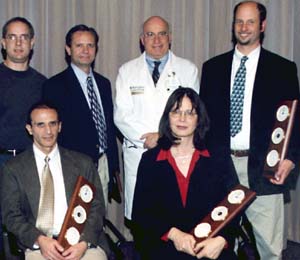Drawing on his experience dressing as a clown to entertain hospitalized children and prison inmates, the teaching style of Dana R. Abendschein, Ph.D., is highlighted with humor and compassion.
His engaging style translates into classroom experiences that facilitate learning and encourage student involvement. So it’s not surprising that Abendschein, associate professor of cell biology and physiology and of medicine, was named the Class of 2005 Professor of the Year at the recent Distinguished Service Teaching Awards ceremony.

Abendschein — who also was honored last year as Professor of the Year — will celebrate 20 years with the School of Medicine in July.
Ian Dorward, president of the class of 2005, took Abendschein’s selective on cardiovascular control mechanisms and considered taking a summer position in his lab. When Dorward chose to work in another lab, he remembered that Abendschein was excited for him and wished him the best.
“He was genuinely concerned that my experience be right for me,” Dorward said.
The Class of 2005 also honored Scott J. Hultgren, Ph.D., the Helen Lehbrink Stoever Professor of Molecular Microbiology, and Henry V. Huang, Ph.D., associate professor of molecular microbiology, in a tie vote for Course Master of the Year.
Dorward recalled that Hultgren was extremely excited about giving lectures, and his enthusiasm was frequently noticed by the class. His primary concern has always been ensuring that students understand the material.
Other award recipientsClass of 2005
Distinguished Teaching Awards Marc J. Bernstein, M.D.
E. Richard Bischoff, Ph.D.
Glenn C. Conroy, Ph.D.
David A. Leib, Ph.D.
Jeff W. Lichtman, M.D., Ph.D.
Jane Phillips-Conroy, Ph.D.
Linda J. Pike, Ph.D.
Joseph L. Price, Ph.D.
Alison J. Whelan, M.D.
Robert S. Wilkinson, Ph.D.
Class of 2004
Distinguished Teaching Awards John P. Atkinson, M.D.
Rosa M. Davila, M.D.
Scot G. Hickman, M.D.
Leslie E. Kahl, M.D.
Hanna Khoury, M.D.
Joel S. Perlmutter, M.D.
Arie Perry, M.D.
Clay F. Semenkovich, M.D.
Morton E. Smith, M.D.
Lynn K. White, M.D.Class of 2003
Resident and Fellow Awards Mary Abusief, M.D.
Jaime Boero, M.D.
David Finlay, M.D.
Neil Horowitz, M.D.
Ronan Lev, M.D.
Sharyn Lewin, M.D.
Terence Myckatyn, M.D.
Chad Perlyn, M.D.
Matt Powell, M.D.
Beth Ward, M.D.Class of 2003
Clinical Teaching Awards Martin Boyer, M.D.
Michael Brunt, M.D.
Thomas Defer, M.D.
David Gutmann, M.D.
Bruce Hall, M.D.
Susan Mackinnon, M.D.
Amy Ravin, M.D.
Walton Schalick, M.D.
Joseph St. Geme, M.D.
Emanuel Vlastos, M.D.M.D.Huang is known for taking the basic-science orientated first-year material, which can seem both dry and boring to students, and making it interesting and accessible. Students agree that he’s an all-around nice guy who loves teaching and is very responsive to students
The Class of 2005 honored Barry P. Sleckman, M.D., Ph.D., assistant professor of pathology and immunology, with the Stanley J. Lang Lecturer of the Year Award. Sleckman is known for his straightforward presentation of material, which challenges students to “think long and hard and want to learn more,” Dorward added.
The Class of 2005 also honored Scott Lovitch, a fifth-year student in the medical-scientist training program, as Teaching Assistant of the Year.
Lovitch, who was a teaching assistant for the cell and organ systems physiology course, is pursuing a combined M.D./Ph.D. through the medical scientist-training program. He is known for his energy and thoroughness and for his non-threatening and helpful demeanor.
Robert S. Wilkinson, Ph.D., professor of cell biology and physiology and instructor of the course, credits Lovitch with ensuring the course ran smoothly.
“That included everything he could do on his own, but he also prodded me to do my job better,” Wilkinson said.
The Class of 2004 recognized Jeffrey E. Saffitz, M.D., Ph.D., the Paul E. Lacy and Ellen Lacy Professor of pathology and immunology and professor of medicine, as Professor of the Year.
Saffitz has long been applauded for teaching the cardiology section of pathology with a clear, concise style that is memorable for its conversational tone.
Jason Stephenson, president of the class of 2004, remembered that when Saffitz learned of his award, Saffitz said that his top priority has always been to ensure that students learn as much as possible while still retaining the information. He explained that the key to accomplishing that is having empathy for the student experience, which allows him to better filter information and stress the most important points.
This is the second consecutive year Safffitz has received the Professor of the Year award.
Erika C. Crouch, M.D., Ph.D., professor of pathology and immunology, was chosen by the Class of 2004 as Course Master of the Year — for the fourth time.
Although long-known as an articulate lecturer, students are consistently impressed with the flawless course-package she presents. As course master for the year-long pathology course, she has the logistically difficult task of coordinating course details with all the professors and students.
The Class of 2004 also named Horacio M. Maluf, M.D., assistant professor of pathology and immunology, as Lecturer of the Year.
Last year, Maluf agreed to teach the gastrointestinal section of pathology on short notice when the position became vacant. Although his status as a new lecturer caused some initial anxiety among students, his witty and entertaining style quickly quelled any fears.
Maluf also used the chalkboard, rather than slides, to demonstrate the processes he was explaining to help simplify the material and allow students to better grasp complex concepts.
Stephenson said that — particularly because of the short-notice situation — the course’s success was due entirely to sheer talent on Maluf’s part because not only was he teaching a large amount of material, but also as a new instructor, he had to develop the course plan from scratch.
Medical students also presented additional awards honoring excellence in teaching. The box at right lists the awards by class year.